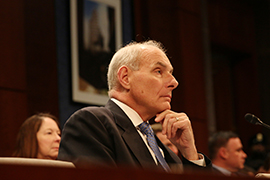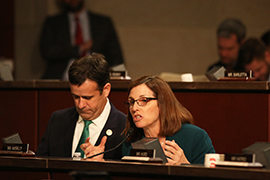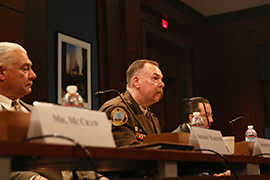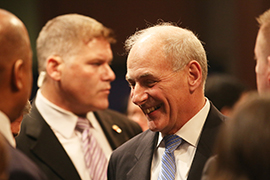- Slug: BC-CNS-Wall Hearing,790
- Photos, video story available (thumbnails, captions below)
By ANDRES GUERRA LUZ
Cronkite News
WASHINGTON – Homeland Security Secretary John Kelly told a House panel Tuesday that a wall will help close the “gaping wound” of the U.S-Mexico border, but that he will rely on local authorities to tell his department where and how to close the border.
Kelly told the House Homeland Security Committee that a wall running the length of the border isn’t likely to be completed right away. Instead, he said, he will meet with border communities that can tell him where it is most urgent to fill in gaps in the border wall and prioritize construction at those locations.
“Maybe there are some places that are too rugged to put a wall,” Kelly said, adding that any gaps could be covered with human patrols and technology.
“But the people that work the border will tell you that physical barriers, and backed up by men and women on patrol, is what we need to secure the Southwest border,” he said.
Yuma Sheriff Leon Wilmot agreed with Kelly, telling the committee during his testimony that a one-size-fits-all approach to securing the entire border would be less effective than going to each community and finding out the best way to secure the border based on local geography.
“Locals know best,” Wilmot said outside the hearing, after Kelly’s testimony.
The wide-ranging, daylong hearing was Kelly’s first appearance before a congressional committee since being sworn in as secretary Jan. 20. The hearing touched on a range of issues, but focused mostly on the flurry of executive orders signed by President Donald Trump in his first days in office, including orders for border wall construction, increased border personnel, a travel ban on incoming foreign nationals and a temporary refugee ban.
While the committee members gave Kelly a warm welcome, the administration’s policies were grilled by many.
Trump campaigned on a pledge to build a border wall and make Mexico pay for it. But opponents on the committee questioned the feasibility of a wall, the problems with financing it and the strain it could have on maintaining trade relations with Mexico.
Rep. Lou Correa, D-California, said he attributes part of his state’s “economic miracle” to the influx of immigrant workers. Fewer Mexicans are coming to the U.S. now, he said, in part because of economic growth south of the border. But policies proposed by Trump, such as a border tax, would affect this growth, Correa said.
But other lawmakers, like Rep. Martha McSally, R-Tucson, said something needs to be done to secure the border and protect Americans.
McSally said she was frustrated by current border security operations in which traffickers can still cross the border, drug dealers are circumventing fixed checkpoints and border patrol agents are assigned jobs far from the border. She also said that the way Homeland Security measures border security is inadequate.
Kelly spent a good portion of the hearing defending Trump’s temporary ban on refugees and a temporary ban on all travelers from seven Muslim-majority countries.
Committee members related stories of refugees barred from entering the country, and pointed to statistics showing a lack of terror attacks committed by refugees from the countries targeted in the ban. If the administration was truly concerned about protecting the U.S. from possible terrorists, there are other countries that should be targeted instead, the lawmakers said, with several specifically citing Saudi Arabia.
Proponents of the travel ban countered with stories of families whose loved ones were killed by deportable immigrants and terror attacks where the culprits’ families came from the countries listed in the travel ban.
Kelly conceded that there are countries, like Saudi Arabia, that have instances of terrorism. But he said the seven countries that made the list have a higher threat of terrorism because they are “failed states,” whose governments do not provide adequate information on the refugees seeking asylum in the United States.
“This is not a Muslim ban,” Kelly said in response to a common attack by critics.
Wilmot said after the hearing that he looks forward to working with Homeland Security under Kelly, and hopes the county can help the federal agency find the right policies.
Wilmot pointed to Yuma’s success securing its section of the border. More than a decade ago, Wilmot said, the border in Yuma County was not secure and many immigrants died in the desert as they tried to cross into the U.S. By 2008, he said, those deaths had fallen by 91 percent through a combination of more border wall construction, increased border patrol and virtual border security.
Wilmot said that what worked for his county may not work for all, but he thinks that border cities that have the same geographic characteristics as Yuma can have the same success by applying its techniques.
^__=
Web links:
_ Committee hearing page: https://homeland.house.gov/hearing/ending-crisis-americas-borders-path-security/
_ Kelly’s testimony: http://docs.house.gov/meetings/HM/HM00/20170207/105474/HHRG-115-HM00-Wstate-KellyJ-20170207.pdf
_ Wilmot’s testimony: http://docs.house.gov/meetings/HM/HM00/20170207/105474/HHRG-115-HM00-Wstate-WilmotL-20170207.pdf
_ Trump border order: https://www.whitehouse.gov/the-press-office/2017/01/25/executive-order-border-security-and-immigration-enforcement-improvements
_ Trump travel order: https://www.whitehouse.gov/the-press-office/2017/01/27/executive-order-protecting-nation-foreign-terrorist-entry-united-states
^__=
Homeland Security Secretary John Kelly listens to lawmakers’ concerns about President Donald Trump’s executive orders on border security and on limiting travel to the U.S. from certain countries. (Photo by Andres Guerra Luz/Cronkite News)
Rep. Martha McSally R-Tucson, expresses frustration during a hearing with the Homeland Security secretary on the current state of border security, citing administrative problems and border gaps. (Photo by Andres Guerra Luz/Cronkite News)
Yuma County Sheriff Leon Wilmot told members of a House committee that local law enforcement officials look forward to working with the Department of Homeland Security to increase border protection. (Photo by Andres Guerra Luz/Cronkite News)
New Homeland Security Secretary John Kelly smiles after he testified to a House committee on the Trump administration’s plans to secure the border and temporarily ban refugees to the U.S. (Photo by Andres Guerra Luz/Cronkite News)



